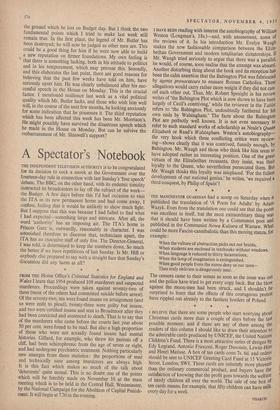FROM THE Home Office's Criminal Statistics for England and Wales
I learn that 1954 produced 109 murderers and suspected murderers. Proceedings were taken against seventy-two of these (most of the others had committed suicide before arrest). Of the seventy-two, ten were found insane on arraignment (and so were unfit to plead), twenty-three were guilty but insane. and two were certified insane and sent to Broadmoor after they had been convicted and sentenced to death. That is to say that of the murderers who came before the courts last year about 50 per cent. were found to be mad. But also a high -proportion of those who were not actually found insane had mental histories. Giffard, for example, who threw his parents off a cliff, had been schizophrenic from the age of seven or eight, and had undergone psychiatric treatment. Nothing particularly new emerges from these statistics: the proportions of mad and technically sane among murderers are always high. It is this fact which makes so much of the talk about `deterrents' quite unreal. This is, no doubt one of the points which will be forcibly made on November 10 at the mass meeting which is to be held in the Central Hall, Westminster, by the National Campaign for the Abolition of Capital Punish- ment. It will begin at 7:30 in the evening. I HAVE BEEN reading with interest the autobiography of William Weston (Longman's, 18s.)—and, with amusement, some of the reviews of it. In his introduction Mr. Evelyn Waugh makes the now fashionable comparison between the Eliza- bethan Government and modern totalitarian dictatorships. 11 Mr. Waugh tried seriously to argue that there was a parallel, he would, of course, soon realise that the attempt was absurd. Another disturbing thing about the book and its reception has been the calm assertion that the Babington Plot was fabricated by agents proyocateurs to ensnare Roman Catholics. These allegations would carry rather more weight if they did not can- cel each other out. Thus, Mr. Robert Speaight in his review writes of 'the Babington Plot which is now shown to have been largely of Cecil's contriving,' while the reviewer in the Tablet refers to 'the Babington Plot, undoubtedly furthered for his own ends by Walsingham.' The facts about the Babington Plot are perfectly well known. It is not even necessary to refer to such standard works of scholarship as Neale's Queen Elizabeth or Read's Walsingham. Weston's autobiography-- the very book which these conflicting critics were review- ing—shows clearly that it was contrived, funnily enough, by Babington. Mr. Waugh and those who think like him seem to have adopted rather an interesting position. One of the great virtues of the Elizabethan recusants, they insist, was their loyalty to the Queen, who nevertheless persecuted them. But Mr. Waugh thinks this loyalty was misplaced. 'For the fullest development of our national genius,' he writes, 'we required a third conquest, by Philip of Spain'1 * *










































 Previous page
Previous page